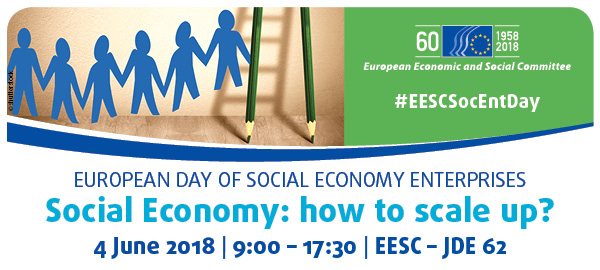
“Social Economy- How to scale up?”
The European Economic and Social Committee held a conference on the 4th of June in Brussels on the topic of how social enterprises can scale up. Successful social enterprises shared their experiences on the road to success. The aim of the event was to propagate the social enterprise model and at the same time create a space for discussions on how to create an impact, have gender equality, and to scale up.
Nicholas Schmit (Ministry of Labour, Employment, Social and Solidarity Economy, Luxembourg). In Luxembourg they had adopted social economy and now see it is vital to be adopted on a larger scale too encourage entrepreneurs to adopt social economy standards. The hope is that social economy is adopted on the level of large enterprises. Start-ups already adopt the social economy approach and Schmit hopes this gains ground and becomes more popular around Europe. Time to be concrete and to develop social economy strategy on the European scale. Also, in Africa, Balkans, etc. The international community has a role to play in helping social enterprises scale up.
Christophe Itier (High Commissioner for Social Economy and Solidarity Economy and Social Innovation, FR) sees that political and economic influencers/decision makers have wrong or different ideas about social economy scaling up (increasing the visibility is often undervalued). They don’t think it is economically viable and it is just a means for social help, but this is simply not true. Therefore, it is necessary to make social enterprises more visible and show that it can be sustainable and economically profitable.
When thinking about scaling up there needs to means to help social economy to grow. Start-ups are the smallest actors in the economy and need more assistance to scale up. Their funding opportunities may be varied and there will be a fund launched at the end of this year to help start-ups out. 1 billion euros will be invested into these projects to help out the innovative and social projects. The Growth pack will have about 100 levers to boost their scale up opportunities.
The social aspect in the form of social innovation needs to be more integrated and now more prominent thanks to the digital age.
Ann Branch (Acting director of DG EMPL) spoke of how the Committee and the DG’s are very committed to helping start-ups and social enterprises. They have done some work on this together with the OECD.
Branch believes that for social economy the scaling up is not always the expanding of the business but increasing the impact. For social enterprises sometimes it is better to replicate the model elsewhere rather than grow.
On the 3rd of July 2018 there will be an event called „Creating value together“ which will address this topic as well.
Inspiring Stories
Margitta Haertal (Pfefferwerk Foundation) is leading a foundation focused on small initiatives. Last year they supported 71 projects in total of 238 thousand EUR. Projects aimed at mostly youth employment, also recycling, etc. As they have their own building, thanks to this they have been independent. Throughout their activities in the 90s they had the support of the media as well as the local politicians. This support helped them in their success.
Lucian Gramescu (Impact Hub Bucharest) is building communities and even of unlikely allies. Their pilot had 8 hubs aiming to support 100 social enterprises. Mostly providing mentorship and a space to work. Scaling start-ups is not a scalable activity- they have an existing system. Therefore, start-ups need custom support and advice to grow.
Antoine Franco (Entrepreneurs solidares, Pole de Cooperation du Centre Isere) introduced their waste and recycling center (a part of the circular economy) which in 2 years grew from 8 to 24 members. Their economic success was supported by starting to charge for services that was initially provided for free.
Marina Andrieu (Women in Digital Empowerment) started a non-profit organization aimed at empowering women by increasing their digital competencies. They started with no money, slowly, without previous experience in the IT field. Everyone suggested big IT companies would support them financially, but that was the not the case. When she thought the NGO will not be a success she met the right people who wanted to help. They had to find other means for financing, such as grants and doing Erasmus+. Their success story is creating a platform which would help teachers teach about gender bias and equality in STEM teaching.
Read more about the event here.
See the presentations of the speakers here
See the Webstream of European Day of Social Economy Enterprises 2018 here
EFMC- European Fund Management Consulting
Kristiina Kook
PR and events coordinator
